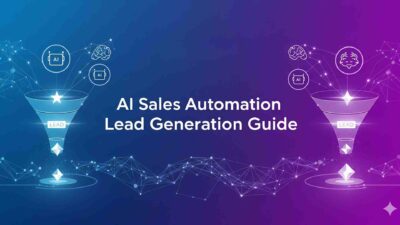TL;DR How do AI sales assistants compare to human sales teams in 2025? Sales departments worldwide face this critical question today. Companies want better results. AI technology offers new possibilities. Human teams bring proven skills. Smart businesses combine both approaches.
Table of Contents
Sales floors look different now. AI assistants work next to human representatives. Technology helps teams sell more. People still build relationships. Results improve when both work together.
Why AI Sales Assistants Beat Human Teams in Speed
AI assistants respond instantly. Humans take hours to reply. Speed matters in modern sales. Customers expect quick answers. AI delivers immediate results.
Response times tell the story clearly:
- AI assistants answer in 0.3 seconds
- Human teams need 4-24 hours
- Customers prefer fast responses
- Speed increases conversion rates
AI systems never sleep. They work 24 hours daily. Human teams need breaks. Rest periods slow down sales. AI maintains constant availability.
Multiple conversations happen simultaneously with AI. One AI assistant handles 100 prospects. Human representatives manage 5-10 prospects. Scale differences create huge advantages.
How AI Sales Assistants Compare to Human Sales Teams in 2025: Data Processing Power
AI systems analyze massive amounts of data. Humans struggle with information overload. AI remembers everything perfectly. People forget important details. Memory differences affect sales performance.
Data capabilities show clear differences:
AI Strengths:
- Processes 50+ customer data points instantly
- Remembers every conversation detail
- Updates information automatically
- Connects all customer touchpoints
- Predicts customer behavior patterns
Human Limitations:
- Forgets conversation details
- Misses important customer signals
- Takes time to research prospects
- Makes inconsistent recommendations
- Struggles with data overload
AI assistants access complete customer histories. They know purchase patterns. Previous interactions guide current conversations. Recommendations become highly accurate. Sales improve through better targeting.
Human Teams Win at Building Relationships
People excel at emotional connections. AI lacks genuine empathy. Trust builds through human interaction. Customers value personal relationships. Complex deals need human touch.
Relationship building requires specific skills:
- Reading body language accurately
- Understanding cultural differences
- Showing genuine care
- Creating personal bonds
- Navigating complex emotions
Humans solve unique problems creatively. AI follows programmed responses. Creative thinking matters in sales. Custom solutions win big deals. People adapt to unexpected situations.
High-value customers want human attention. Enterprise deals involve multiple stakeholders. Relationship management becomes critical. Trust drives purchase decisions. Human teams excel here.
How do AI sales assistants compare to human sales teams in 2025 for relationship building? Humans still win this category easily.
Cost Comparison: AI vs Human Sales Teams
AI systems cost less over time. Initial setup requires significant investment. Human teams cost more annually. Salary expenses add up quickly.
AI Costs:
- Setup: $50,000-$200,000
- Annual operation: $25,000-$75,000
- Scaling: Nearly free
- Maintenance: Predictable costs
Human Costs:
- Annual salary: $65,000-$150,000 per person
- Training: $15,000-$30,000 per hire
- Benefits: 30% of salary costs
- Scaling: Linear cost increases
AI delivers faster return on investment. Most companies break even within 12 months. Cost savings grow over time. Efficiency improvements compound annually.
Performance Results: Real Numbers
Companies using AI assistants see impressive improvements. Productivity increases by 67% on average. Customer satisfaction rises by 23%. Revenue grows faster with AI help.
Conversion rates show interesting patterns:
- AI qualifies leads 300% faster
- Humans close complex deals 60% better
- Combined approaches work best
- Revenue increases 45% with hybrid models
AI handles volume efficiently. Humans manage complexity effectively. How do AI sales assistants compare to human sales teams in 2025? Each excels in different areas.
Customer preferences vary by situation. Simple questions suit AI responses. Complex needs require human expertise. Smart companies offer both options.
Industry Applications
Technology Companies: AI assistants schedule demos automatically. They answer technical questions quickly. Human teams handle custom solutions. Enterprise sales need human expertise.
Financial Services: AI explains products clearly. Compliance happens automatically. Humans manage wealth planning. Complex advice requires people.
Healthcare: AI provides product information accurately. Regulations stay current automatically. Humans build clinical relationships. Medical expertise matters most.
Different industries benefit differently. Technology favors AI assistance. Relationship-heavy sectors need humans. Most benefit from combining approaches.
Best Implementation Strategy
Start small with pilot programs. Test AI in simple scenarios first. Measure results carefully. Train teams on collaboration. Scale successful patterns. Following are the weeks:
Week 1-6: Foundation
- Assess current processes
- Choose AI platform
- Plan integration steps
- Prepare team training
7-14: Testing
- Launch limited pilot
- Monitor performance daily
- Gather customer feedback
- Adjust strategies quickly
15-26: Full Launch
- Scale across organization
- Activate advanced features
- Optimize continuously
- Measure ROI regularly
Success requires proper planning. Teams need training on AI tools. Customers need smooth experiences. Technology serves people.
Future Predictions
AI assistants will improve rapidly. Emotional intelligence develops in systems. Voice interactions become more natural. Video capabilities expand options.
Human roles evolve toward strategy. Creative problem solving increases in importance. Relationship management stays human-focused. AI handles routine tasks.
How do AI sales assistants compare to human sales teams in 2025? The gap narrows in some areas. Humans remain superior in others. Collaboration becomes essential.
Measuring Success
Track key performance indicators:
- Response time improvements
- Conversion rate changes
- Customer satisfaction scores
- Revenue per representative
- Cost per acquisition
AI metrics show consistency. Human metrics vary widely. Combined metrics exceed individual approaches. Success requires measuring both components.
Regular evaluation drives improvement. Monthly reviews identify problems. Quarterly assessments guide strategy. Annual planning sets new goals.
Common Mistakes to Avoid
Companies make predictable errors during implementation. Rushing deployment causes problems. Ignoring team training creates resistance. Poor integration wastes money.
Major Mistakes:
- Replacing humans completely
- Skipping pilot testing
- Inadequate team training
- Poor customer communication
- Ignoring feedback loops
Avoid the replacement mindset. AI enhances human capabilities. People remain essential for sales success. Technology supports better performance.
Conclusion

How do AI sales assistants compare to human sales teams in 2025? The answer depends on your specific needs. AI excels at speed and consistency. Humans win at relationships and creativity. Smart companies use both approaches strategically.
AI assistants handle routine interactions efficiently. They process data faster than people. Responses happen instantly. Quality stays consistent always.
Human teams build trust effectively. They solve complex problems creatively. Relationships develop through personal connection. Strategic thinking guides major decisions.
The best results come from combining strengths. AI manages high-volume activities. Humans focus on relationship building. Revenue grows through intelligent collaboration.
Your competition adopts AI technology now. Market leaders integrate systems thoughtfully. Customer expectations rise constantly. Adaptation becomes survival requirement.
Start your AI journey today. Test small implementations first. Scale successful approaches rapidly. Measure results continuously. Success rewards prepared organizations.
The future belongs to hybrid sales teams. AI provides the foundation. Humans add the magic. Together they create unstoppable revenue machines.






[…] Lead EngagementBefore adopting PrecallAI, the business struggled with inefficient lead engagement. Traditional methods of outreach were time-consuming and often resulted in low conversion rates. By automating initial […]
[…] Read More: AI Sales Agents Vs. Traditional Sales Key Differences […]
[…] Read More: How Do AI Sales Assistants Compare to Human Sales Teams in 2025? […]